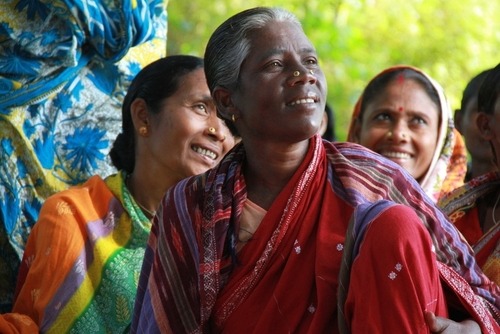Women, seeds and sustainability

Fairtrade International’s Reykia Fick met with the Fairtrade cotton cooperative Chetna Organic’s CEO, Arun Ambatipudi and Technical Head (Entomology), Ram Prasad Sana at the Textile Sustainability Conference in Istanbul. Photo by Vipul Kulkarni.
“Having control over seed is the essence of Fairtrade. Fairtrade is not only about pricing. It is about farmers’ ownership over agriculture. Without seed there is no agriculture. The most basic human right is control over seed.”
So says Arun Ambatipudi of Chetna Organic when we meet at the global Textile Sustainability Conference in Istanbul last week. Everyone from hip clothing brands to factory owners to scientists have come together to discuss how to make the clothing we wear in harmony with nature.
But perhaps no organization present embodies this vision of sustainability more than Fairtrade and organic certified cotton cooperative Chetna Organic. For Chetna Organic, Fairtrade is just the beginning.
Chetna is at the heart of the fight to preserve non-GM cotton in India. More than 90% of all cotton in India is genetically modified. And much of the remaining cotton is hybrid and thus does not produce seeds that can be replanted. This means farmers are stuck buying their cotton seeds year after year.
“Seed is the most vital input. Almost 50% of farmer’s expenditure in cotton goes towards buying seeds. There are even times where the seed companies create artificial seed shortages to drive up prices,” Arun explains.
Chetna has partnered with international and local government research institutes for their participatory seed multiplication and seed conservation programmes. The scientists are identifying and developing natural varieties of cottonseed suitable for the local growing conditions and organic agriculture. Chetna is training their member farmers to save cotton seeds to plant for the next season.
The focus on seed is much more than a vague philosophical notion of sustainability. It is a lifeline for farmers. According to Chetna’s Ram Prasad Sana:
“When the cost of cultivation is high, farmers are not able to get their investment back and the result is suicide or migration. Low cost cultivation is vital for farmers, and this means organic and sustainable methods of cultivation.”
Control over seed is furthermore bound together with control for women.
“Women have always been the custodians who have protected seed. This has steadily disappeared. We are now working to revive and preserve this practice through developing women seed guardians. When women become seed guardians, it means women have a greater say.
“As men usually make the decisions, we are lobbying in favor of female control over farming. With the Fairtrade-supported interventions in place, we are now witnessing their husbands slowly starting to support them.”
“Our interest in Fairtrade is to move towards being women-centric, how women can also have more control within cooperative structures though it requires investing substantial time,” says Arun.
Arun tells me that along with seed saving, one of Chetna’s goals is “reduction in drudgery for women”. Women now spend a lot of their time on menial, laborious tasks. For example, a woman can spend three to four hours each day just carrying water.
“If we can ensure faster access to water for women, then women can use that time more productively in educating their children, managing local enterprises, etc. The cost of women carrying water is extremely high on India’s GDP.”
Chetna is working to provide appropriate tools for farm women – pushcarts so women don’t have to carry heavy loads, lighter and better quality gardening tools that don’t need to be sharpened as often.
“Women usually squat to weed with sickles, so we came up with the idea of promoting a weeding tool which resembles a golf stick. Women can just swing it back and forth from a standing position. It is much faster for them and doesn’t hurt their back.”
Arun concludes: “We know that the situation won’t change overnight. But we are seeing successes, of women seed guardians gaining respect and decision power.”
Find out more about Chetna Organic’s seed guardian programme here.
Read a past blog post about Chetna Organic’s Premium projects here.
Photo of Fairtrade cotton farmer members of Chetna Organic




